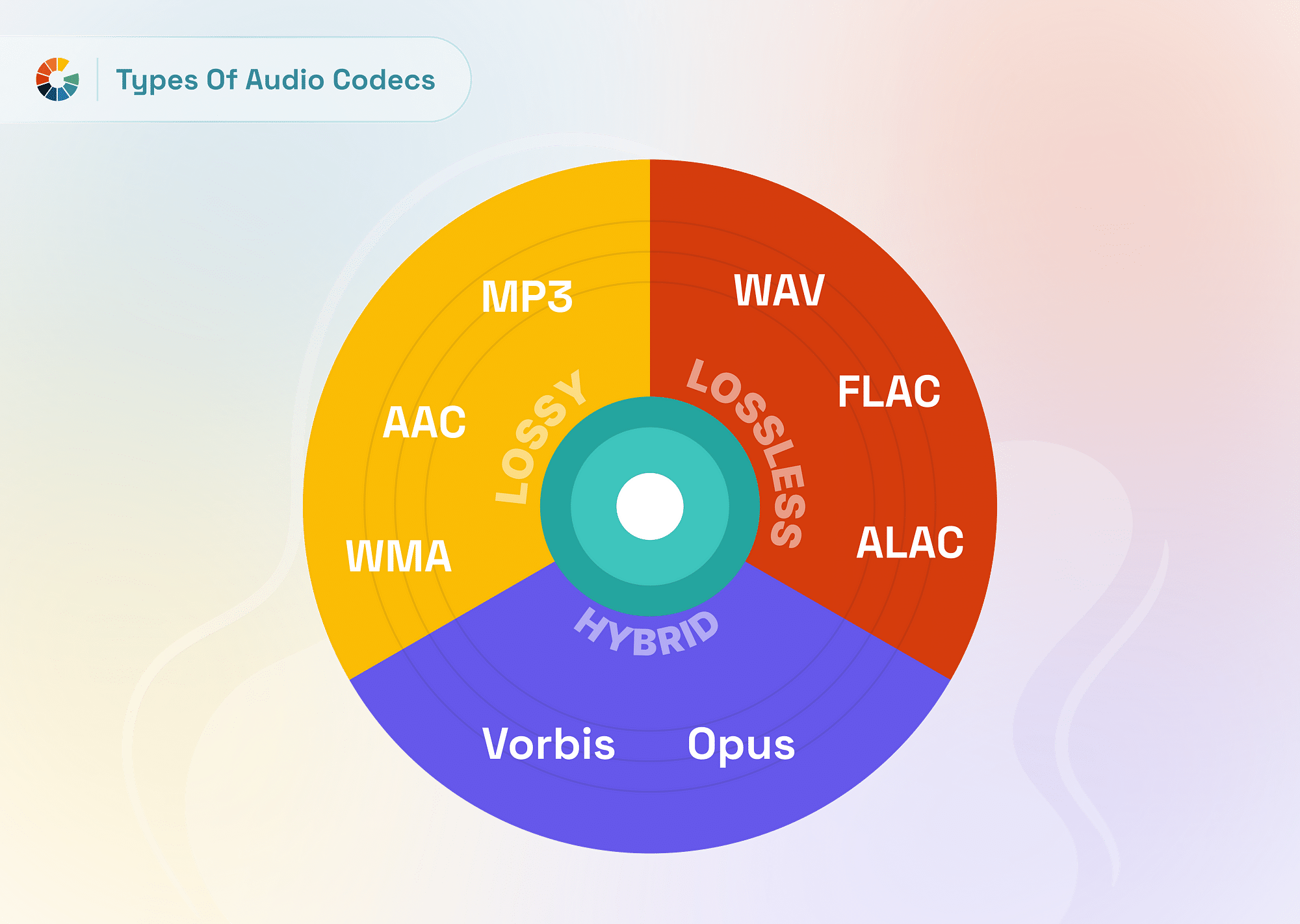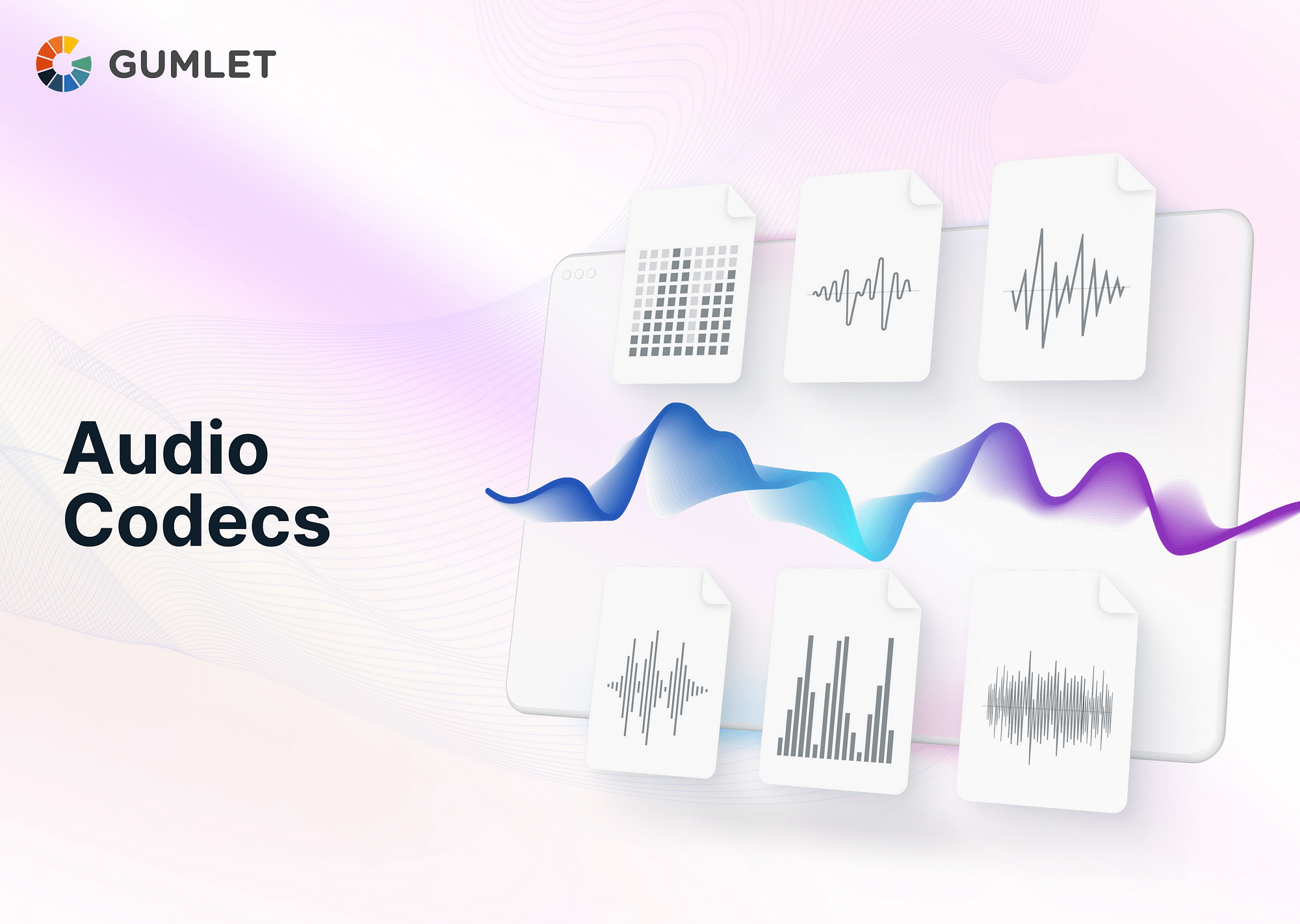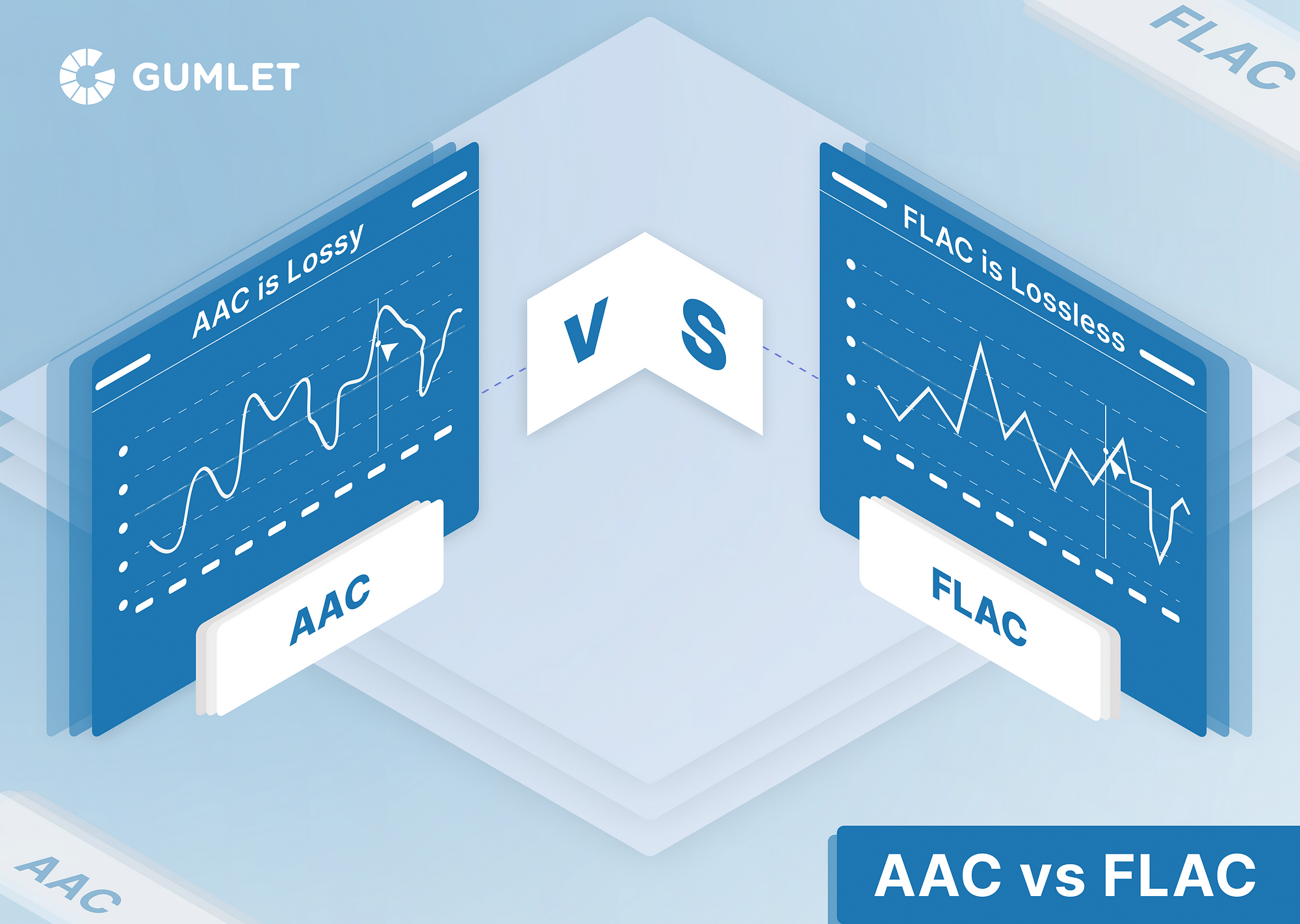As technology advances, the demand for high-quality audio streaming has grown significantly. To ensure that you provide your audience with the best possible audio experience, it is essential to understand and choose the right audio codec for your needs.
What is an Audio Codec?
An audio codec is a software or hardware algorithm that compresses and decompresses digital audio data to reduce its size for easier transmission and storage. Audio codecs play a crucial role in various applications, including music streaming, video conferencing, VoIP calls, and digital audio playback, enabling efficient transmission and storage of audio content.
Different codecs use various techniques and compression algorithms to achieve optimal audio quality and file size, ensuring smooth streaming experiences and efficient use of storage space.
Schedule a Demo with Our Video Expert!
Discover how Gumlet can help you build a cutting-edge video streaming infrastructure.
Compression Types of Audio Codecs
There are two primary compression types of audio codecs: Lossy and Lossless codecs. There are a few hybrid audio codecs available too. A hybrid audio codec is a type of codec that combines both lossless and lossy compression techniques. This allows the codec to balance sound quality and file size well.

Lossless Codecs vs Lossy Codecs
| Feature | Lossless Audio Codecs | Lossy Audio Codecs |
|---|---|---|
| Audio Codec Example | FLAC, ALAC, WAV | MP3, AAC, Ogg Vorbis |
| Compression | Preserves original audio quality | Reduces file size by discarding some audio data |
| Audio Quality | Highest fidelity | Good quality, some loss at high compression |
| File Size | Largest | Smaller file sizes |
| Storage Efficiency | Least efficient | More efficient |
| Compatibility | Moderate (growing support) | Universally compatibility |
| Processing Power | Lower processing requirements | May require more processing power to decode |
| Cost | Royalty-free (except for ALAC) | May have licensing fees (MP3) |
List of Best Audio Codecs
Below is an overview of the best audio codecs for streaming audio and a comparison table to help you choose the right codec for your needs.
FLAC (Free Lossless Audio Codec)
FLAC (Free Lossless Audio Codec) is a popular audio compression format known for its lossless quality, preserving the original audio fidelity without any loss in data. It allows users to enjoy high-quality audio files with significantly smaller file sizes than uncompressed formats, making it ideal for audiophiles and music enthusiasts.
| Specifications | Details |
|---|---|
| System Requirements | Low |
| Compression Type | Lossless |
| File formats supported | FLAC |
| Royalties/Patents | None |
| Sampling Rate | Up to 655,350 Hz |
| Recommended Bitrate | Variable |
| DRM Support | No |
- Common use cases: High-quality music streaming, archiving
- Compatibility: High compatibility with most devices and platforms
- Encoding Speed: Moderate
ALAC (Apple Lossless Audio Codec)
ALAC (Apple Lossless Audio Codec) is an audio compression format developed by Apple Inc. that retains the original audio quality while reducing file sizes. It offers seamless integration with Apple devices and software, making it a preferred choice for Apple users who desire high-fidelity audio without compromising storage space.
| Specifications | Details |
|---|---|
| System Requirements | Low |
| Compression Type | Lossless |
| File formats supported | M4A |
| Royalties/Patents | None |
| Sampling Rate | Up to 384,000 Hz |
| Recommended Bitrate | Variable |
| DRM Support | No |
- Common use cases: Apple ecosystem, high-quality music streaming
- Compatibility: Best compatibility with Apple devices, good compatibility with other platforms
- Encoding Speed: Moderate
AAC (Advanced Audio Coding)
AAC (Advanced Audio Coding) is a widely used audio compression format known for its superior sound quality and efficiency. Developed as the successor to MP3, AAC provides higher compression rates while maintaining excellent audio fidelity, making it a popular choice for music streaming services and portable media players.
| Specifications | Details |
|---|---|
| System Requirements | Low |
| Compression Type | Lossy |
| File formats supported | M4A, MP4, 3GP |
| Royalties/Patents | Yes |
| Sampling Rate | Up to 96,000 Hz |
| Recommended Bitrate | 64-320 kbps |
| DRM Support | Yes |
- Common use cases: Streaming services, podcasts, YouTube videos
- Compatibility: High compatibility with most devices and platforms
- Encoding Speed: Fast
WMA (Windows Media Audio)
WMA (Windows Media Audio) is an audio compression format developed by Microsoft, primarily designed for Windows-based devices and platforms. It offers a range of compression options, providing high-quality audio at lower bitrates, making it suitable for online streaming and efficient storage of music files on Windows systems.
| Specifications | Details |
|---|---|
| System Requirements | Low |
| Compression Type | Lossy |
| File formats supported | ASF, WMA |
| Royalties/Patents | Yes |
| Sampling Rate | Up to 48,000 Hz |
| Recommended Bitrate | 64-320 kbps |
| DRM Support | Yes |
- Common use cases: Windows ecosystem, streaming services
- Compatibility: Best compatibility with Windows devices, moderate compatibility with other platforms
- Encoding Speed: Moderate
MP3 (MPEG-1 Audio Layer 3)
MP3 (MPEG-1 Audio Layer 3) is a widely recognized and popular audio compression format known for its efficient file size and decent sound quality. It revolutionized digital music by enabling easy sharing and distribution of music files, paving the way for the digital music era and the rise of online music platforms.
| Specifications | Details |
|---|---|
| System Requirements | Low |
| Compression Type | Lossy |
| File formats supported | MP3 |
| Royalties/Patents | Expired |
| Sampling Rate | Up to 48,000 Hz |
| Recommended Bitrate | 32-320 kbps |
| DRM Support | No |
- Common use cases: Music streaming, podcasts, general-purpose audio
- Compatibility: High compatibility with almost all devices and platforms
- Encoding Speed: Fast
Vorbis OGG
Vorbis OGG, commonly referred to as OGG, is an open-source audio compression format known for its high-quality audio and efficient file size. It is favored by many for its patent-free status, making it a popular choice for streaming, storing, and sharing high-fidelity music without licensing restrictions.
| Specifications | Details |
|---|---|
| System Requirements | Low |
| Compression Type | Lossy |
| File formats supported | OGG |
| Royalties/Patents | None |
| Sampling Rate | Up to 200,000 Hz |
| Recommended Bitrate | 64-500 kbps |
| DRM Support | No |
- Common use cases: Gaming, streaming services, open-source projects
- Compatibility: Good compatibility with most devices and platforms
- Encoding Speed: Moderate
Opus
Opus is a lossy audio compression format that offers high-quality sound while reducing file sizes significantly. It is widely used for streaming, broadcasting, and storing music due to its efficient compression algorithms and support for various bitrates.
| Specification | Details |
|---|---|
| System Requirements | Low |
| Compression | Lossy |
| File Formats Supported | .opus |
| Royalties/Patents | No |
| Sampling Rate | Up to 48,000 Hz |
| Recommended Bitrate | Variable bitrate up to 510 kbps |
| DRM Support | No |
- Common use cases: Streaming services, online gaming, VoIP applications
- Compatibility: Broad compatibility across different devices, operating systems, and software applications.
- Encoding speed: Fast
Which Audio codec is right for you?
Selecting the right audio codec for your needs depends on several factors, including the desired compression ratio, file size, compatibility, and storage.
- Compression Ratio: Lossless codecs like FLAC and ALAC offer high-fidelity audio quality but larger file sizes, ideal for high-fidelity storage, while AAC or Opus balance audio quality and compression for smaller file sizes.
- Compatibility: MP3, AAC, and OGG Vorbis are widely compatible across devices, software, and streaming services. Choose a codec that fits your specific requirements for seamless integration.
- File Size and Storage: Lossless codecs prioritize audio quality over file size, making them ideal for archival or professional audio production, limited storage capacity, and bandwidth-constrained environments.
Additionally, consider factors like encoding speed, support for metadata, and any associated royalties or patent restrictions, as they can impact your choice and overall project requirements.
Benefits of audio codec
Audio codecs offer numerous advantages that enhance the overall audio experience. Here are some key benefits:
- Efficient storage: Audio codecs compress digital audio files, significantly reducing their size and allowing more files to be stored in a limited space. This is particularly important for large audio libraries or streaming services that need to optimize storage.
- Reduced bandwidth usage: Compressed audio files consume less bandwidth during streaming, leading to faster buffering and fewer interruptions. This is crucial for ensuring a smooth listening experience, particularly on slower internet connections or mobile networks.
- Faster download and upload times: Smaller file sizes enable quicker downloads and uploads, improving the overall user experience and saving time for both content creators and consumers.
- High-quality audio: Modern audio codecs are designed to provide excellent audio quality, even at lower bitrates. This ensures listeners enjoy clear, high-quality audio without excessive storage space or bandwidth.
- Wide compatibility: Many audio codecs are designed with cross-platform compatibility in mind, ensuring that audio files can be played on a wide range of devices and platforms. This is essential for content creators who want to reach the broadest possible audience.
- Adaptive streaming: Some audio codecs support adaptive streaming, automatically adjusting the bitrate based on network conditions. This feature ensures a continuous streaming experience even when network conditions fluctuate.
- Support for metadata: Audio codecs often include support for metadata, such as track titles, artist names, and album art, enabling a richer listening experience and easier organization of audio libraries.
By leveraging these benefits, audio codecs play a crucial role in improving the overall audio experience for both content creators and consumers.
Applications of Audio codecs
Audio codecs play a vital role in various applications by compressing and decompressing digital audio data. Here are some common applications and the relevant audio codecs for each:
- Music streaming services: Services like Spotify, Apple Music, and Tidal rely on audio codecs to provide high-quality music streaming with efficient bandwidth usage. Lossy codecs like AAC and MP3 are widely used due to their balance between audio quality and file size, while lossless codecs like FLAC and ALAC are used for higher-quality streaming options.
- Podcasts: Podcasts require efficient audio compression for easy distribution and streaming. MP3 is a popular choice for podcast creators because of its compatibility with most devices and platforms, while AAC is also gaining traction due to its slightly better audio quality at similar bitrates.
- Video platforms (e.g., YouTube): Video platforms like YouTube incorporate audio codecs to compress audio tracks in uploaded videos. AAC is the recommended audio codec for YouTube videos, as it provides a good balance between audio quality and file size.
- Gaming: Audio codecs are used in the gaming industry to compress game audio, ensuring optimal audio quality without consuming too much storage space or processing power. Vorbis OGG is a popular choice for gaming audio due to its open-source nature and good audio quality at relatively low bitrates.
- Telecommunication systems: Audio codecs play a crucial role in telecommunication systems, such as VoIP (Voice over Internet Protocol) services and video conferencing. Codecs like Opus, G.711, and G.729 are specifically designed to compress speech audio for efficient transmission over networks while maintaining voice clarity.
- Audio archiving: For preserving audio files without any loss of information, lossless codecs like FLAC and ALAC are ideal choices. These codecs enable high-quality audio archiving while still reducing the file size compared to the original uncompressed audio.
By understanding the specific requirements of each application, you can choose the most relevant audio codec to ensure the best possible audio experience for your audience.
How to Solve “audio codec not supported”?
The "audio codec not supported" error can occur due to various reasons. Here are some common causes and their respective solutions:
- Outdated Media Player: Do older media player versions fail to support newer audio codecs or specific file formats?
How to solve: Install the required codec or a codec pack, which includes a collection of codecs that can help your media player handle various audio formats. - Missing codec: Does your media player lack the necessary codecs to decode and play certain audio formats?
How to solve: Install the required codec or a codec pack, which includes a collection of codecs that can help your media player handle various audio formats. - Corrupted audio file: Is the error related to a damaged or corrupted audio file triggering codec-related errors?
How to solve: Re-download the audio file from a trusted source or, if possible, re-encode the file using a reliable audio converter. - Incompatible device or platform: Is the "audio codec not supported" caused by an incompatible device or platform?
How to solve: Convert the audio file to a compatible format using an audio converter or choose a codec with broader compatibility. - Incompatible device or platform: Is the issue due to restricted DRM on the audio file, which prevents playback on unauthorized devices or platforms?
How to solve: Ensure that your device or platform is authorized to play the protected content or look for a DRM-free alternative.
By addressing these common causes, you can resolve the "audio codec not supported" error and enjoy a seamless audio playback experience.
Conclusion
In conclusion, the best audio codec for streaming depends on your priorities. Choose AAC for broad compatibility and efficient compression, balancing quality and file size. For utmost quality, FLAC suits archival or high-fidelity needs despite larger file sizes. Consider your platform, bandwidth, and storage limitations to optimize streaming audio performance.
FAQs
- Is AAC lossless?
AAC is not lossless; it's a lossy audio codec that offers efficient compression with good audio quality.
- Is Opus better than AAC?
Opus is generally considered better than AAC for its superior compression efficiency and quality, especially in low-bitrate scenarios.
- Do audio codecs affect latency in real-time applications?
Yes, audio codecs can affect latency in real-time applications, with lower-latency codecs like Opus being preferred for such use cases.
- Which codec is better AAC or MP3?
AAC is generally better than MP3 in terms of audio quality and compression efficiency, making it a preferred choice for streaming and modern audio applications.




